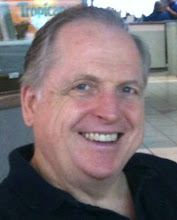Shortly after graduating from college I had the opportunity to travel for a few weeks in Europe--I was a graduate counsellor at Florida State University's Study Center in Florence, Italy, and had a couple of weeks off in the summer. I went to Switzerland, and did some labor in return for room and board at an inn in Zermatt, on the side of the Matterhorn. In my spare time, I hiked up the Matterhorn as far as someone could go without a guide and climbing gear. Should I have wanted to go to the top, I would have needed a guide--someone who had been there many times and knew what I needed to do--and wear--to achieve the goal. At the time I didn't have that kind of money, so I got as far as the climbers hut that is the starting-off place for a real ascent of the mountain.
In the U.S. Army, on my way to Vietnam, I became a paratrooper. In three weeks at Fort Benning, GA (at the age of 22), I went through lots of hands-on-practice guided by experienced instructors. As an officer, when we made our first five jumps at the culmination of the training, I was the first to leave the plane. A colonel had spoken to us before our first jump, reminding us that, after we opened our parachutes, if we saw anything other than a circle of white above us, use our reserve parachutes. When I jumped, a panel melted in my parachute and I had a circle of white above me with a big patch of blue (a blown gore). I used my reserve parachute and remembered what my mother taught me about putting sheets on a bed--that's what I had to do to get the air under the reserve parachute. I landed just a little faster than normal with both parachutes fully open. (I later learned that experts use parachutes designed to be the way mine was.) At the time I was very thankful to have had a mentor whose advice I followed less than 30 minutes after receiving it. (I only had 10 jumps in my career and loved them. After I left the Army I found it hard to justify the risk, though it is fun!!)
When I have sought to engage in other work that I perceived as challenging, I have sought mentors. I invested $4,000 as a discount price to be a protege of a mentor who I believed had some real insights that would help me in book publishing and in building net worth.
School districts frequently have mentoring programs for new teachers--someone who is an experienced teacher who can guide new teachers through the challenges of the first few years of teaching.
Three years ago I registered on the Federal government database to be a contractor and recipient of grants. As a full-time teacher, I didn't have the time to follow-through with any. This summer I renewed my registration and also registered with the ORCA (word for Shark) database--another government-required registration site. President Barack Obama, in his Recovery Act program, has improved two federal websites to help people and small businesses find government contracts and grants. These websites are FBO.gov and Grants.gov. By following the instructions and registering on the federal CCR database--first obtaining a DUNS number individuals and organizations can be ready to do business with the Federal Government. ORCA registration is another step to take after the CCR registration is complete. The Business Partners Network is designed to be a "single source for vender data for the Federal Government.
To be successful with Federal Grants, all the "i's" need to be "dotted" and the "t's" need to be "crossed." I applied for a Federal Education Grant this summer and had only a few hours to complete the Letter of Intent (LOI). The Grant Administrator called to my attention that the project I proposed (or the way I had proposed it) didn't match the Grant Application Requirements.
For contracts, the Federal Government relies on the Federal Acquisition Regulation (FAR) as its guide. If a bid for a contract does not meet all the requirements for that contract as listed in the FAR, it will not be considered.
Needless to say, working with the Federal Government either looking for grants or bidding for contracts seems to be as complex as climbing a mountain. Of course a mentor would be helpful. The challenge is to find a mentor who will add value and who will not require an "up front" payment. By this I mean that someone working with me to secure a grant is entitled to some of the moneys secured by his or her efforts to secure the grant. It would be built into the grant proposal. The same concept applies to a mentor for federal contracts. It's much better if the mentor can share the risks and rewards with the mentee.
Thursday, August 27, 2009
Subscribe to:
Post Comments (Atom)




No comments:
Post a Comment
Thanks for your comments. They will appear on the blog shortly.